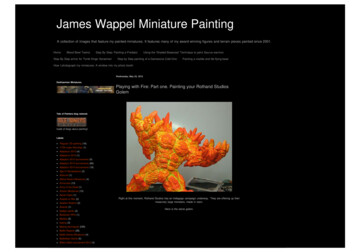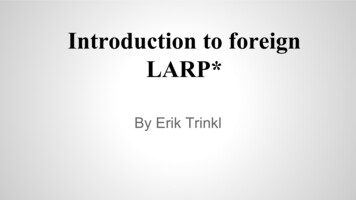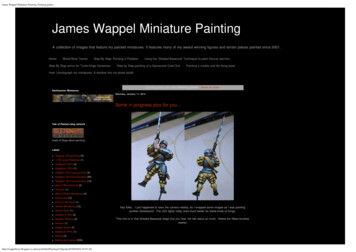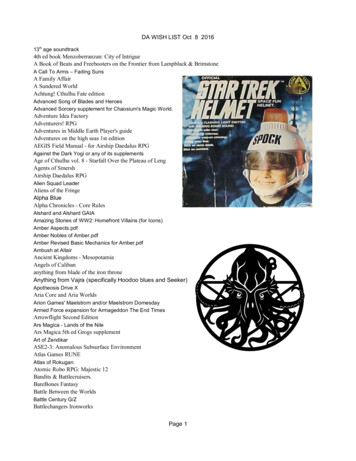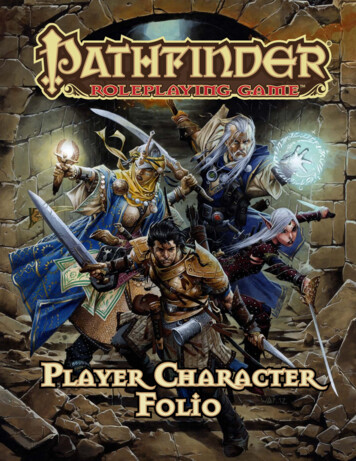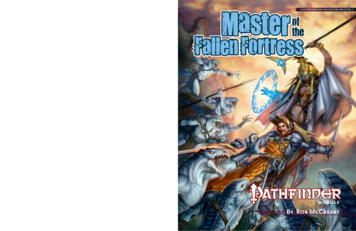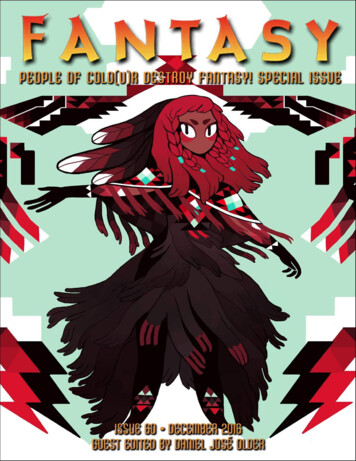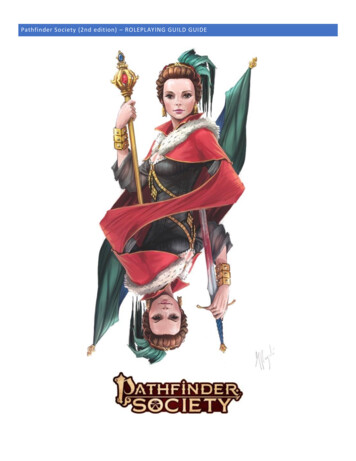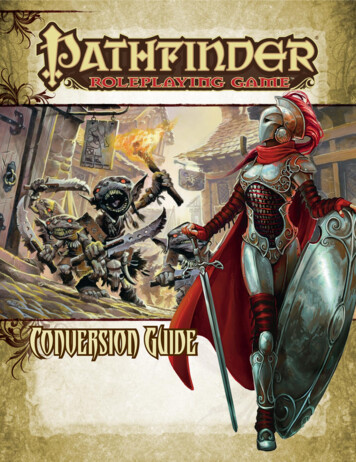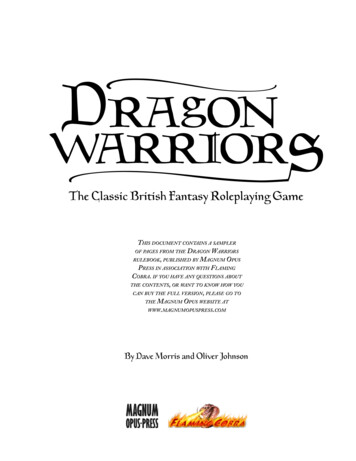
Transcription
The Classic British Fantasy Roleplaying GameThis document contains a samplerof pages from the Dragon Warriorsrulebook, published by Magnum OpusPress in association with FlamingCobra. if you have any questions aboutthe contents, or want to know how youcan buy the full version, please go tothe Magnum Opus website atwww.magnumopuspress.comBy Dave Morris and Oliver Johnson
Chapter 2CREATINGA CHARACTERPlaying a role is what makes FRP really special,and what makes an FRP adventure far more exciting than any solo gamebook or computer adventurecould be. You should choose a personality for yourcharacter—which need not be anything like yourown personality. You can experiment and see whatit’s like to see a world through the eyes of someone with different attitudes or beliefs, or a differentskin colour or race, or a different gender. During anadventure, try to act in a way that reflects the roleyou have chosen.Start by thinking a little about your character’spast life. Maybe you’ve chosen to play an impoverished noblewoman, perhaps? She should demandsome deference from the other player-characters,and moan bitterly if she has to borrow money fromthem to support her doubtless extravagant tastes. Oryour character might be an ex-soldier, just back fromthe Crusades. Maybe he finds the unprofessionalapproach of his fellow adventurers to be annoyinglyamateurish. His conversation could be a string ofmilitary clichés and anecdotes. A roving Barbarian could find civilization hard to understand, andmight prefer to solve most problems using an axe.A scholarly Sorcerer might go off on an expeditionjust to collect ancient objets d’art. Gold and silverwould mean nothing to him. He has no interest inthe tactics of adventuring, so he would leave thewarriors in the party to decide on any battle plans.Consider also ‘your’ attitude to the rest of theparty. Without a doubt you will eventually meet—orBefore you can begin your first Dragon Warriors game, each player must create a character whowill be his or her fantasy ‘alter-ego’ in the Lands ofLegend, the world of the game. Only ordinary sixsided dice are needed for this.RoleplayingNewcomers to fantasy roleplaying (‘FRP’) oftenspend their first few games immersed in the wondrous new world that it opens up. For a while theyfind it enough merely to ‘pretend themselves’ intoadventures where they can creep nervously downthe winding black tunnels of the Ogre’s lair andseek vast wealth in the cobweb-draped vaults of theVampire’s crypt. If you are new to gaming, feel freeto skip ahead to ‘Step One’ below, and come backto this section later—perhaps after you have triedplaying an adventure or two.Players eventually tend to consider other aspectsof the GamesMaster’s fantasy world. What is dailylife like between adventures? Who are the locallords, and what are the political intrigues betweenthem? Most importantly, what is ‘your’ (meaningyour character’s) attitude to the world around? Whydid he or she become an adventurer rather than, forinstance, a blacksmith, a merchant, or whatever profession his or her parents followed? Questions likethis are the starting point for true roleplaying.17
Dragon Warriorseven play—the cowardly villain who covets treasureso much that he runs off with the loot while hiscomrades are battling the monster. Less familiar isthe brave adventurer who will risk his own life todelay a foe while his friends retreat. Our own campaign includes the tale of Dagronelt the Harpist,who befriended an NPC (a ‘non-player character’operated by the GM) and then experienced a conflict of loyalties when the other player-charactersfought the NPC in question.You may also want to create a background anda life story for your character: where they’re from,what their family is like, why they chose their profession, and any important experiences they mayhave had before the game started. There are threeways that you can work out this information. Firstof all, you can simply choose for yourself: read therest of the book to get a clear idea of the world inwhich the Dragon Warriors game takes place, anddecide how you want your character to fit into it.(Subject to the GM’s approval. You cannot simplydecide that your character is heir to a kingdom!)Alternatively, you can create it randomly. Thereare tables to generate more detail about your character’s region of origin and other backgroundinformation in Chapter 6: ‘In the Beginning’. ForGamesMasters, these are also useful for creatingnon-player characters (NPCs) in a hurry.If you want to get stuck into playing the gamestraight away, then feel free to skip that chapter forthe moment. There is no need to develop an entirelife history at the start of your first game, though.You can always come back to it later. Often a character will take on a persona of his own after you haveplayed him a few times, and you and the GM canadd events or details to his background later on.of each characteristic is found by rolling three sixsided dice (3d6), and therefore ranges from a minimum of 3 to a maximum of 18.Strength is a measure of the character’s fitness andphysical toughness.His Reflexes score indicates his dexterity, agility andspeed of reactions.Intelligence shows how clever the character is (soa player who rolls low for this ought to role-play asthough he really is dim-witted).Psychic Talent represents the character’s basic abilityto resist (and in some cases use) magic.The character’s Looks score reflects his appearanceand personal charm; this has no bearing on hisadventuring skills, but you should certainly take it intoaccount when deciding how non-player characters(NPCs) would react to him.The player rolls 3d6 for each of these five characteristics, then, and records the scores in the appropriate boxes on his character sheet. These scores willnever change—except in rare cases, through illnessor sorcery.Each player will require a blank Character Sheetlike the one shown on the next page, to keep trackof their character’s scores. A full-size character sheetwill be found at the back of the book, and you maymake as many photocopies of it as you need.Special note: The luck of the dice means thatsometimes a player will create a character withhopelessly bad scores, quite unsuited to life as anadventurer. The player may discard the characterand roll up another. It is for you, as GamesMaster,to decide whether a character is ‘hopeless’ or not. Asa guideline, we suggest you allow a player to discardany character with more than two characteristicsbelow the average (9 to 12) range.Step TwoChoosing aProfessionStep OneTheCharacteristicsIn the Dragon Warriors game there are seven Professions to which an adventurer may belong: Assassin,Knight, Barbarian, Elementalist, Sorcerer, Mystic and Warlock. Players who have never playedan RPG before may find it easiest to play either aKnight or a Barbarian. These two classes don’t needto concern themselves with magic or stealth, justcold steel, mighty thews and valour.Each character is initially defined by his scores infive characteristics. These are Strength, Reflexes,Intelligence, Psychic Talent and Looks. The value18
Creating a Characterwant a character who could be a Viking warrior, or askilled brawler from the pages of fantasy novels, likeConan or Fafhrd.Assassins are average in combat but excel insneak attacks, when they can target an unwaryopponent. They are by far the most stealthy character class in the game, and gain a variety of otherabilities that might seem magical to the unwary. Playan Assassin if you want a character who could havecome straight out of a martial-arts fantasy movielike Crouching Tiger, Hidden Dragon or Hero, or whoemulates one of the great rogues of fantasy literaturelike the Gray Mouser.Sorcerers are the most common and generalmagic-wielding character profession—if any ofthese rare individuals can be called ‘common’. Theyare relatively ineffective in mundane combat but canblast their foes with magic. They have a more variedrepertoire of spells than Elementalists and a littlemore raw magical power than Mystics. Play a Sorcerer if you want a character resembling Merlin, orGandalf, or Harry Potter.Mystics use magic of a sort, but this is a personal magic that comes from the Mystic’s masteryof his own mind rather than some external source. AMystic is a good all-rounder, not quite so magicallystrong as a Sorcerer or Elementalist, but reasonably capable in combat and with a few other usefulspecial abilities. Play a Mystic if you want to dazzleyour foes with the power of your character’s mindalone.Elementalists are specialist magicians, usingthe power of the natural elements to achieve theiraims. Each Elementalist’s magic is focused arounda particular element, chosen from among Fire, Air,Earth, Water and Darkness. Like Sorcerers, theytend not to be very skilled with conventional weapons such as swords and bows. Play an Elementalistif your favourite characters are the shamans, witchesand druids of legend and fantasy literature.Finally, Warlocks combine magic with swordplay. They can wear armour and use their spells toboost their combat abilities. They aren’t quite soversatile in combat as Knights or Barbarians, butcan be devastating when armed with their preferredweapons. Play a Warlock if your favourite fantasyhero is Elric, or just if you want the best of bothworlds!The player decides now to which of these Professions she wants her character to belong, and notesthis at the top of her character sheet.a sample blank character sheetIn any case, Knights and Barbarians will be by farthe most common classes in most Dragon Warriorsgames. Indeed, there is no particular need to includethe other classes at all for many adventures, and somecampaigns will play out in their entirety with onlythese two. Most parties, though, will have a balance,with perhaps a majority of Knights and Barbariansand the occasional Mystic, Sorcerer, Elementalist orWarlock. Assassins are scarce indeed, and are oftenbetter fitted to use in solo adventures (with onlyone player character and the GM) or campaigns inwhich everyone plays an Assassin!Knights are the best all-around fighters inDragon Warriors. Though physically less robust thanBarbarians, they are able to wear heavy armour without losing any of their combat skills. Play a Knightif you want a character who strives to be like KingArthur, or Lancelot, or Gawain.Barbarians are better in attack, but defensivelyless skilful than Knights. Their fighting style isfast and mobile, and heavy armour hampers them.They are able to go berserk in combat, making theirattacks still more ferocious. Play a Barbarian if you19
Dragon WarriorsStep ThreeHealth PointsA character’s initial Health Points score increases ashe advances in rank (of which, more later).Step FourThe Combat FactorsHaving chosen his Profession, the player can roll hischaracter’s Health Points score. A character’s HealthPoints (or HP) show how robust he is. Wheneverthe character takes a wound in combat, the woundis expressed as a number which comes off his HPscore.The character falls unconscious when his HealthPoint score reaches 0, and will die if it is ever reducedto –3 or less. Lost Health Points can be recuperatedby resting after the adventure—as long as the character survives (see page 68).The player is now ready to determine her character’sattack and defence scores. No further dice rollingis required—you have already made the necessaryrolls and choices. The basic scores are:for Assassins:for Barbarians:for Elementalists:for Knights:for Mystics:for Sorcerers:for Warlocks:A Knight starts with 1d6 7 Health Points (roll 1d6and add 7).A Barbarian starts with 1d6 9 Health Points.An Elementalist or Sorcerer starts with 1d6 4 HealthPoints.For an Assassin, Mystic or Warlock, initial HealthPoints are found by rolling 1d6 5attack score is 13, defence score is 5attack score is 14, defence score is 6attack score is 11, defence score is 5attack score is 13, defence score is 7attack score is 12, defence score is 6attack score is 11, defence score is 5attack score is 12, defence score is 6These are, in fact, the scores for an average character at the start of his career. If the player rolledabove or below the average range (9–12) on certainof his characteristics at Step One, she may have toJH20
Creating a Charactermodify her attack and defence scores slightly as aresult—see the Effects Table below.After making any adjustments, the player shouldenter these attack and defence scores on theircharacter sheet. (In subsequent adventures, as thecharacter rises in rank, these scores will increase.)The way in which attack and defence are usedin the game is explained in Chapter 8: The Rules ofCombat.average range—see the Effects table below.Elementalists, Sorcerers, Mystics and Warlockshave a magical attack score. (Assassins, Barbarians, and Knights do not need a magical attackscore as they cannot cast spells.) The basic magicalattack score is 15 in the case of Elementalists andSorcerers, 14 in the case of Mystics, and 13 in thecase of Warlocks. This basic score is modified if thecharacter’s Intelligence and/or Psychic Talent areoutside the average range. As above, see below.The rules for using magical defence and magicalattack are in Chapter 9: The Use of Magic.Step FiveMagical CombatFactorsStep SixDodgingattack and defence, as we shall see, represent thecharacter’s fighting prowess. In the Dragon Warriors world, where magic is a reality, it follows thatthese Combat Factors must have a magical analogue: magical attack and magical defence.The basic magical defence score is 3 forAssassins, Knights, and Barbarians; 4 for Mysticsand Warlocks; and 5 for Elementalists and Sorcerers. This base score is modified if the character’sIntelligence and/or Psychic Talent fall outside theSome attacks are not covered by the normal combatrules of Chapter 8. A character who tries to parry adragon’s fiery breath with only a sword is going tobe fried! In such cases, the best thing is to dodgeout of the way. The score that shows how good thecharacter is at dodging is evasion.The basic evasion score at 1st rank is 3 for anElementalist, Mystic, Sorcerer, or Warlock, 4 for aKnight, and 5 for an Assassin or Barbarian. This isEffects of High and Low Characteristic Scoreson Attack, Defence, etc.Characteristic scoreCharacteristic3 4 5 6 7 8 9 10 11 12 13 14 15Strength –2 attack –1 attack No Effect 1 attack–1 defence No Effect No Effect No EffectReflexes –1 attack No Effect No Effect No Effect–2 defence –1 defence No Effect 1 defence–2 evasion –1 evasion No Effect 1 evasion–1 stealth No Effect No Effect No EffectIntelligence–1 attack No Effect No Effect No Effect–1 defence No Effect No Effect No Effect–1 magicalNo Effect No Effect No Effectattack–1 magicalNo Effect No Effect No EffectdefencePsychic Talent –2 magical –1 magical No Effect 1 magicaldefencedefencedefence–1 perception No Effect No Effect No EffectNot applicable* Not applicable* No Effect 1 magicalattack*Characters with Psychic Talent of 8 or less cannot use magic.2116 17 18 2 attack 1 defence 1 attack 2 defence 2 evasion 1 stealth 1 attack 1 defence 1 magicalattack 1 magicaldefence 2 magicaldefence 1 perception 2 magicalattack
Chapter 4THEWIZARDSIn the Dragon Warriors game there arefour magic-using professions, each with differentspecialisations, strengths and weaknesses. They areknown collectively as ‘wizards’. Ordinary peopledon’t understand that there are different types ofspell-caster, and treat all those who deal in magicwith a mixture of suspicion and fear.Sorcerers are those who seek to master the arcaneenchantments which enable them to draw energyfrom other dimensions and channel it accordingto their wishes. They make poor fighters but theirspells can be quite devastating.Mystics, on the other hand, meditate so as toharmonize themselves with the unseen forces ofNature—perhaps we would call them ‘psionics’ inmodern terminology. Mystics learn something ofthe fighting arts, and many of their spells serveto enhance the Mystic’s own physical and mentalprowess. They can generally cast fewer spells perday than the other wizardly character classes.Elementalists strive to master the raw elementsof nature, rather than studying the more refineddweomers of Sorcerers, but are otherwise similar.Warlocks work their magic much like Sorcerers or Elementalists, but their spells are devoted toenhancing their already mighty prowess in weaponcombat. They are the most capable of the wizardlyclasses in the ways of the warrior, even when all theirmagic is exhausted.Any player choosing to be a wizardly characterwill soon realize the big difference between themagic-using Professions and the fighting Profes-sions. Sorcerers, Elementalists, Mystics, and Warlocks are able to use a lot of power in a short time,but once their spells are exhausted they are relativelyweak. A wizardly character who comes, fresh andwith spells undiminished, to a battle with a Knight,Assassin or Barbarian of similar rank will usuallywin. If the magician had already used his day’s spells,however, the reverse would be true. Over a typicaladventure—four hours (game-time) in a monsterridden dungeon, say—the whole thing averagesout. As a GamesMaster you may find it useful toremember that short adventures favour the magicians while long adventures favour the fighters.Each of the four Professions is able to use a particular type of spells. These four spell groups arequite different, with little or no overlap, so as to fitthe particular styles of each character class.There is a further distinction between Mysticsand the other spell-users. When a Sorcerer, Warlock, or Elementalist casts a spell he expends MagicPoints to do so; when he has used up all his MagicPoints he can use no more spells that day. Mysticsdo not have Magic Points. When a Mystic casts aspell, she makes a check to see whether she ‘fatigues’her spellcasting ability; when this psionic ‘fatigue’occurs, the Mystic can cast no more spells that day.On average, a Mystic and a Sorcerer or Elementalist of equal rank will be able to use roughly thesame number of spells in a day—but whereas theSorcerer always knows precisely how much spellpower (in the form of Magic Points) he has left,the Mystic can never be sure when she is going to29
Dragon WarriorsThe Special Abilitiesof a Sorcerersuffer ‘fatigue’. Mystics have to get used to a life ofuncertainty. To balance out this uncertainty a little,each Mystic may select one Mystic spell which sheis capable of casting at will, without risking fatigue.In effect, this one spell has become an innate ability,so carefully honed and practised that the Mystic canleave it ‘always on’ if desired.Sorcerers do not rely only on their innate ability tocast spells. A study of sorcery imparts the techniquesneeded to prepare scrolls, potions and minor magicalitems. A high-ranking Sorcerer will go adventuringwith a small arsenal of such magical adjuncts.Sorcerers are trained in four unique skills: CalligraphyAlchemyArtificeUse of WandsCalligraphyThis is the ability to prepare magical scrolls, a skillknown to any Sorcerer of 4th rank or higher. Thetotal cost of the basic materials for a scroll will be3-18 crowns: parchment of high quality is called for,along with gold leaf and some rare and expensivepigments. The scroll may be for any spell that theSorcerer is able to cast (that is, whose level doesnot exceed his rank), and the maximum number ofMagic Points placed in the spell is limited by theSorcerer’s rank. An 8th-rank character could notwrite out a scroll for a 9 MP Wall of Magic, eventhough he could personally cast the spell at threetimes that strength. The process of inscribingand illuminating a scroll takes a full lunar month(twenty-eight days).Each scroll that a Sorcerer prepares temporarily suppresses 2 points of his normal Magic Pointsscore until it is used. A 10th-rank Sorcerer with fivescrolls at his belt would thus have 25 MPs instead ofhis usual 35.SORCERERSSorcerers are the civilised, scholarly magicians,found in most lands other than in Thuland and theMercanian Coast where Elementalists predominate.They use their knowledge and wits to master magic.All Sorcerers are left-handed.Minimum RequirementsA player who wishes his character to be a Sorcerermust roll scores of at least 9 for both Intelligenceand Psychic Talent. If these scores are below average, the character is not qualified to study sorcery.SpellcastingSorcerers have a certain number of Magic Pointsavailable each day, which they use to cast spells. SeeChapter 9: The Use of Magic for full details of Sorcerer spells and spellcasting.AlchemyAlchemy is the science which governs the preparation of potions and thaumaturgic compounds. ASorcerer first begins to master this skill when hereaches 6th rank.A fully equipped laboratory, which can be established at a cost of some two hundred crowns, is thefirst prerequisite. This comprises a lot of equipment,so the Sorcerer must have somewhere to set it all up.If he later needs to relocate his laboratory (maybethe locals think he’s doing something unholy), 220 crowns of the set-up cost can be salvaged in theform of small portable items and ingredients.Sorcerers and ArmourThere is nothing to stop a Sorcerer wearing heavyarmour, but it is not usually a good idea. Sorcerers are not trained to fight in armour, for one thing,and suffer combat penalties if they do so (see p. 71).More seriously, armour hampers the freedom ofmovement necessary if the Sorcerer is to make accurate occult gestures (see p. 77). Few Sorcerers wearanything heavier than a suit of padded armour.30
The WizardsJHIt takes twenty-eight days to distil a potion. In anormal-sized laboratory there could be up to tenpotions ‘on the boil’ at one time. The Sorcerer cannot leave these bubbling away while he goes off onan adventure; the alchemical process calls for continual supervision as various ingredients are mixedand added, vaporized, condensed and filtered.There is always a chance that the Sorcerer willdo something wrong or miss out some vital ingredient. This gets less likely as his experience grows.The chance that a potion will turn out misbrewedand useless is 40% when the Sorcerer is 6th rank,decreasing by 10% per rank above the 6th. This rollis made by the GamesMaster; the Sorcerer onlyfinds out whether he got the formula right when he(or someone else) drinks it.Full details of the various potions are given inChapter 13, on pp138-141.The Sorcerer does not become a Master Alchemist overnight. At 6th rank he knows how to distilonly the less complex potions. Others must waituntil he gains more experience:Sorcerer’s Potions which canrankbe prepared6th DexterityOccult AcuityStrength7th all the above plus HealingReplenishmentPoisonTheriac8th all the above plus Night VisionSmokeAmianthus Dust9th all the above plus ControlTruthLoveSleep10th all the above plus TransformationDreamsthe Elemental EssencesEvaporating PotionElixir VitaeVirus LunareCost C100C100C200C200C200C200C200C250C180CArtificeThis is the skill involved in constructing magicamulets, talismans and rings. It is a very precise science, and there is only a very slight chance (5%) thatthe item will turn out flawed or useless. The work31
Dragon WarriorsChapter 6In theBeginningThe purpose of this chapter is to give eachplayer-character a background, a provenance uponwhich the player can build his life history from birthto the time he enters the campaign as a young bloodof 1st rank. The same procedure can also be usedfor NPCs (non-player characters) if required, asthe tables below will supply a history for any newlyrolled character.Often a player will like to concoct his own lifehistory. The GamesMaster will certainly allow andencourage this if the player’s ideas are (1) interesting and (2) do not conflict with the needs and styleof the GM’s campaign. But sometimes players takethe chance to be extravagantly optimistic (‘Okay,I’ve worked out my life story—I’m heir to the Kingdom of Algandy ’), and at other times even themost inspired player will find his imagination flagging. Then it is time to let the dice lead the way:refer to the tables below and see what result you get.You may be surprised to find that your new Knightcharacter was born into a merchant’s household orthat your Assassin could have followed his fatherinto the Plasterers’ Guild. How can this Warlockbe a scion of the nobility, how can this Sorcerersuffer the stigma of coming from a community ofcharcoal-burners? Finding answers to questions likethese will spur you into developing a fully fleshedout personal history.Having created a new character, dice are rolled todetermine his social position by birth—i.e. whetherone or both of his parents were nobles, peasantsor whatever. Since most 1st-rank characters willprobably be about 17-22 years old, it should not besurprising that this is not always the social positionthat the character now enjoys. A lot of water canpass under the bridge in seventeen years. The GMwill often rule that the character has suffered severalchanges of fortune in his time.Take the example of Launfric, a character whomthe dice indicate to be of noble blood. The GMmay decide that this roll applies only to his mother,abducted in her youth by raiders from Mercania. A birthmark on his forearm is Launfric’s onlyclue to his father’s identity. Or possibly it was hisfather who was the noble—a lord who dallied witha comely tavern-wench one night and passed onwithout a second thought for the brat he had sired.Yet another alternative would be that a rival lordhad slain Launfric’s parents and taken his father’slands. Launfric is then a dispossessed heir, doubtlessscheming for the day he will take revenge on hisparents’ murderer.There are many ways for the GM to ensure hiscampaign is fair and balanced between all the players while at the same time giving each player-character a colourful and individual life history.Interlude: social classMost of the societies of the Lands of Legend arefeudal, with the complex system of mutual obligation and status structure that this entails. It will help50
In the Beginningif players have some idea of the relative status ofthe various classes. Bear in mind that status is notentirely fixed. There is some degree of social mobility—not much in an orderly region such as Chaubrette, but in Algandy or northern Albion leviesmay be knighted in the same battle that deprives. alord of all his estates. Modifiers such as wealth andprestige (especially high office in the Church) alsomake a great deal of difference. Riolta, the 1st-rankSorceress, provokes only sullen looks and mumbled prayers when she passes a group of serfs tillingthe fields, but if she survives to become Riolta theWyrdcaster, wealthy 6th-rank Sorceress with herown (appropriated) castle, even great barons maytreat her with respect.The nobility are the powerful lords and theirfamilies—men such as Montombre, Grisaille andBaron Aldred (p. 152). Their attendant knightsform the gentry, and this class also comprisesminor lords-of-the-manor. (The erstwhile lord ofAxbridge village, Sir Hathnar, was such a one, thevavasour or sub-vassal of Aldred, who removed himand took direct responsibility for Axbridge about ayear before the events described in Chapter 19.)The division between town and country isbeginning to take shape, although it is only alongthe shores of the Coradian coast that more thanone-tenth of the population choose the former withits admixture of wealth and squalour, security anddiscomfort.Craftsmen have the highest status in the town—after the local nobility and gentry, of course. Theseare the masons, shipbuilders, carpenters, etc., whoare now beginning to consolidate the Guilds, destined to wield much power in the centuries to come.At approximately the same level we find the learnedprofessionals—the scribes, lawyers, doctors and soon. Next are the tradesmen, a group comprisingsuch occupations as butcher, grocer and baker.Below these come the menials, who are essentially the feudal working class. Rather than following a set occupation throughout his life, a memberof this class will do whatever job he can find thatpays him a living. Some will belong to the townguard, unless this function is performed by soldiersof the king or the local lord. Extra guards will betaken on at festival times, and some university townshave a separate force for the ‘gown’. Other menialsJH51
Dragon Warriorswill perform tasks such as lighting the street-lamps(some towns have bronze bowls full of pitch set atthe end of main thoroughfares), collecting refuseand sewage, delivering pitchers of water , town-crying and burying the dead. Last of all are a group wemay call the riffraff, using this term to encompassbeggars, street hawkers, whores (but not the morereputable madams who could almost be consideredprofessionals and borrow some of the status of theirprestigious patrons), cutpurses, lazars and otherindigents.In the countryside, the pre-eminent class arethe freemen. To this group belong farmers, artisans(blacksmiths, wheelwrights, armourers, etc.), foresters, innkeepers (like the famous Gully, whose inn isthe best in northern Albion), and the men-at-armswho form the bulk of a castle’s garrison. They arethe feudal middle-class, few in number but usuallyquite well off by the standards of the time. Manyown horses, swords and even armour. They are theirlord’s vassals and owe him a number of services,including forty days in his army each year, but theyown property and may come and go as they please.Below the freemen come entertainers and merchants. Though it should be added that bards , whojourney from castle to castle with their epic talesand songs of vanished glory, are really very highlyregarded a
come straight out of a martial-arts fantasy movie like Crouching Tiger, Hidden Dragon or Hero, or who emulates one of the great rogues of fantasy literature like the Gray Mouser. Sorcerers are the most common and general magic-wielding character profession—if any of these rare individuals can be called 'common'. They

